
Consortium News
UAF BLaST highlights Scientists of the Month
By Amy Topkok
Since 2016, the Biomedical Learning and Student Training (BLaST) program at University of Alaska Fairbanks (UAF) has highlighted scientists from all biomedical fields through its Scientist of the Month articles. These are shared across all UAF and University of Alaska Southeast rural campuses and with BLaST’s partners: Iļisaġvik College, Fort Lewis College, Diné College, Salish Kootenai College and Alaska Pacific University. For more Scientist of the Month highlights, visit the BLaST website.
Read below to learn more about the most recent Scientists of the Month: Daphne Mueller, Tirzah Bryant and Christian Bolton.
Daphne Mueller, December 2022 Scientist of the Month
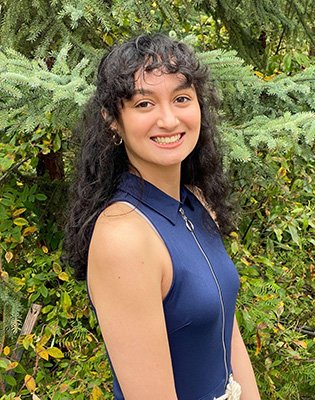
BLaST Scholar Daphne Mueller
Daphne Mueller is a senior majoring in biological sciences with a concentration in cell and molecular biology, and she plans to graduate in May 2023 from UAF. She is a fifth-year BLaST Scholar, Honors College Scholar and a first-year Climate Scholar. She is of Filipino descent and grew up in Utqiaġvik, Alaska. She enjoys playing the clarinet and piano, being outdoors and baking.
Mueller started her research journey back in her home community of Utqiaġvik at IỊisaġvik College under the guidance of Linda Nicholas-Figueroa, PhD. Mueller learned many lab skills such as pipetting and PCR, and gained experience training and mentoring other undergraduates in the lab. She presented her results from her research at the American Society of Microbiology conference in 2019, and at One Health Conferences at UAF in 2020 and 2021. Mueller also assisted Nicholas-Figueroa on her grant report for this project.
After she transferred to UAF, Mueller joined Andrej Podlutsky, PhD, who is a former BLaST faculty pilot project awardee, and Sasha White, a graduate student and former BLaST Graduate Research and Mentoring Assistant (RAMP), on the project “Omega-3 Intake in Alaska Native Diet and Type 2 Diabetes.” Mueller and White co-presented on this project at the One Health Conference in 2019.
Mueller is currently working with former BLaST faculty pilot project awardee Andrés Lopez, PhD, on fish and fisheries genetics. Her research now focuses on the diet of the Common Merganser, a freshwater duck usually found on rivers and lakes, and developing assays to detect environmental DNA from fish species on the Chena River in Fairbanks. Mueller presented results from her fish project in a virtual oral presentation at the Alaska Chapter of the American Fisheries Society conference in spring 2021.
In the summer of 2022, Mueller completed her capstone project, “Microbial community diversity in sediment and water from the Chena River.” She presented the results of her capstone virtually at the Midnight Sun Science Symposium held in April 2022 at UAF and in-person at the American Biomedical Research Conference for Minority Students (ABRCMS) in November 2022.
Mueller shared her appreciation for her past and current mentors.
“I’ve worked with several amazing mentors throughout my time at UAF, [such as] Dr. Andrej Podlutsky and one of his graduate students, Sasha White,” she said.
“My current mentor is Dr. Andrés López [and] I appreciate the freedom I have been given to work on my own research in his lab and learn how to set up a project from start to finish. I’d also like to thank Dr. Mario Muscarella for his help with my capstone. I also want to thank Dr. Linda Nicholas-Figueroa. Without her and my experience working with her, I don’t think I would have gone into research.”
Mueller also shared about her positive experience with peers in the BLaST program.
“I’d like to give a shout out to the undergraduates I worked with in Dr. Linda’s lab. We mentored each other and learned so much together,” Mueller said. “And a final thank you to my BLaST RAMPs Emily Sousa and Theresa Vertigan, I have felt so much support from them!”
Tirzah Bryant, January 2023 Scientist of the Month
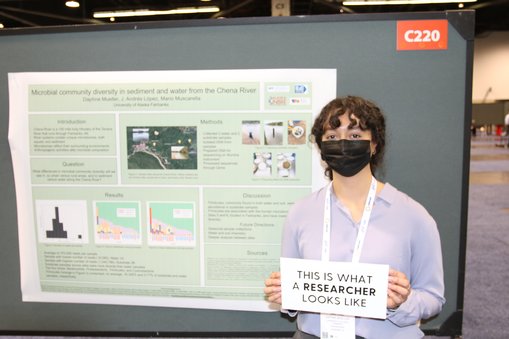
Mueller presented her poster at ABRCMS Nov. 11, 2022 in Anaheim, California.
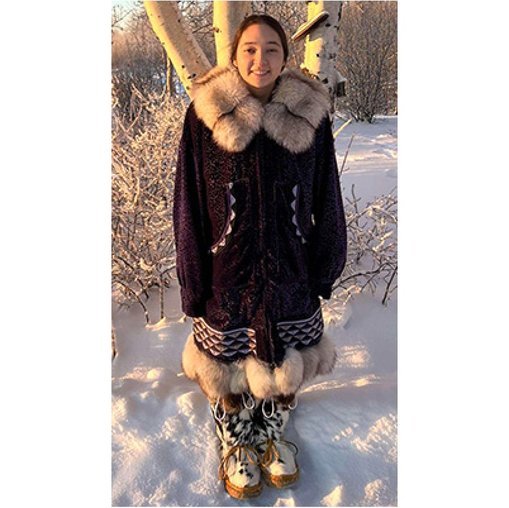
BLaST Scholar Tirzah Bryant in her traditional parka and kkakene (Koyukon word for fur boots), Galena, Alaska. Photo credit: P. Green, 2022
Tirzah Bryant graduated from UAF in December 2022 with a Bachelor of Science in wildlife biology. While she was at UAF, Bryant participated in the BLaST program developing her research skills.
Her family is Athabascan from Galena, Alaska. She plans to pursue a master’s degree in wildlife biology at UAF and study the Galena Mountain Caribou Herd near Galena.
Bryant’s research focuses on subsistence food sources in interior Alaska with snowshoe hares.
“Researching snowshoe hares with my faculty mentor Dr. Knut Kielland taught me how to use peer-reviewed literature to build my knowledge, analyze data through photo datasets, utilize RStudio [a free and open-source tool for data science and enterprise-ready professional software], and take what I have learned and apply it to my research. This has given me the confidence to ask my own research questions,” Bryant said.
“I hope to better understand the movements and interactions between the wildlife like snowshoe hares and caribou that inhabit the areas where I grew up in Galena and on the Yukon River. I would like to encourage kids from Galena (and other villages in Alaska) to pursue a career in science by sharing my work. My research will allow us to better understand the subsistence resources we have been living alongside for generations so that we can continue to do so for many more.”
Bryant also worked as a biological science technician for the U.S. Fish and Wildlife Service’s Koyukuk/ Nowitna/Innoko Wildlife Refuge during the summers of 2020 to 2022, where she worked in partnership with their migratory bird program.
She assisted biologists to band migratory birds under the guidance of Supervisory Wildlife Biologist Julian Fischer and Galena Deputy Refuge Manager David Zabriskie.
Bryant expressed her gratitude for Kielland, a professor at the Institute of Arctic Biology, who taught her how to start with an interest area and narrow it down to a research question that leads to an organized research project.
“[Kielland] gave me the guidance and the patience needed to develop this project myself. He was also very understanding and flexible with my busy college schedule, [which is] a mentor attribute I valued. He stressed that while my research was important, I needed to keep my education my number one priority,” Bryant said.
“Because of BLaST, I connected with a research mentor who is helping me achieve my future educational and career goals.”
She also thanked her BLaST Research, Advising and Mentoring Professionals (RAMPs) Andrew Cyr and Emily Sousa, who were also “huge supporters of my research interests and were always there for me to help me get through my classes as well as any research challenges.”
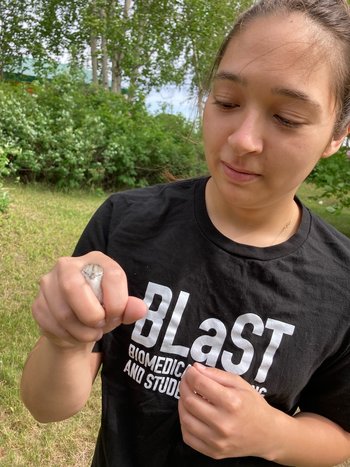
Bryant holding a Yellowlegs chick.
Photo credit: J. Bryant, June 2022
Christian Bolton, February 2023 Scientist of the Month
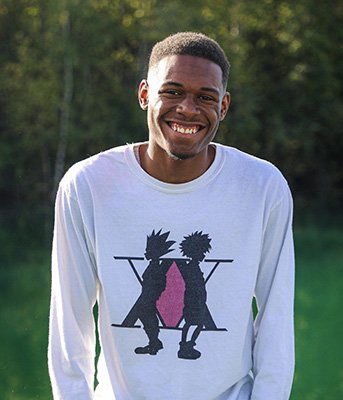
BLaST Scholar Christian Bolton, Fairbanks, Alaska. (Photo credit: C. Bolton, 2022)
Christian Bolton, a third year BLaST Scholar, is a junior at UAF pursuing a Bachelor of Science in biological sciences with a concentration in biomedicine.
He is originally from Mississippi and has lived in many places being part of a military family. He will graduate in May 2024 and plans to attend medical school to become a cardiologist.
In his free time, he enjoys playing basketball, watching Netflix and hanging out with friends.
As a BLaST Scholar, Bolton has worked on many different research projects. His first research project involved measuring the efficacy of a text-messaging program to improve fruit and vegetable consumption with Andrea Bersamin, PhD, a biology professor at UAF.
Another previous research project was exploring cancer cells’ ability to repair themselves after being exposed to radiation in Andrej Podlutsky’s, PhD, lab.
Bolton's current project examines warming temperatures in the Antarctic ocean that are affecting marine wildlife.
He is evaluating enzyme activity in different tissues of Antarctic fish to evaluate the ability of these fish to anaerobically generate ATP in a process called glycolysis.
Bolton said this research is important because as the temperatures of Antarctic waters get warmer due to climate change, there is less oxygen. The concern, he said, is how this will affect creatures’ ability to produce energy.
“By working with Dr. Kristin O’Brien, I learned that there are similarities between how fish and humans react to certain stimuli. The research done on fish can be translated and used for humans as well. This revelation has demonstrated to me how One Health connects humans, wildlife and the environment,” Bolton said.
“It is exciting to understand how things are structured and work together to form a more balanced, healthy habitat. This is why I fell in love with biomedicine and human anatomy. I am excited to see the results of our research.”
Bolton has been provided with many experiences and skill sets with different mentors. He would like to thank Podlutsky (a previous BLaST Faculty Pilot Project awardee), Andrea Bersamin, PhD, (a BLaST Faculty Pilot Project awardee) and his current mentor O’Brien, PhD, a professor of biology and wildlife.
“They have each given me guidance on how to become a proper researcher with well-structured training and availability for when I have questions. I also receive freedom to learn and grow on my own as they provide me with an environment that accepts mistakes as learning experiences and teachable moments,” he said.
“I would also like to thank my RAMP Hannah Robinson, as she has been with me throughout my transitions between labs [and has been] fantastic support for me as a student and BLaST scholar.”
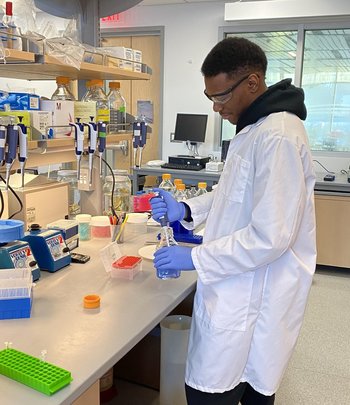
Bolton working in Dr. O’Brien’s lab pipetting.
Photo credit: G. Snyder, 2023
The BLaST program is a NIH-funded UAF program that enhances capacity for undergraduate biomedical research training and efficacy for engaging students from diverse, especially rural Alaskan, backgrounds in education and training for biomedical research careers. BLaST started in 2014 and continues to provide research opportunities for faculty, staff and students through its many workshops, curriculum and research support, and is in its second five-year phase II program.
Questions about this article or BLaST publications, can be directed to Amy Topkok at aktopkok@alaska.edu.
The Coordination and Evaluation Center at UCLA is supported under award number U54GM119024.

Grow Together.
